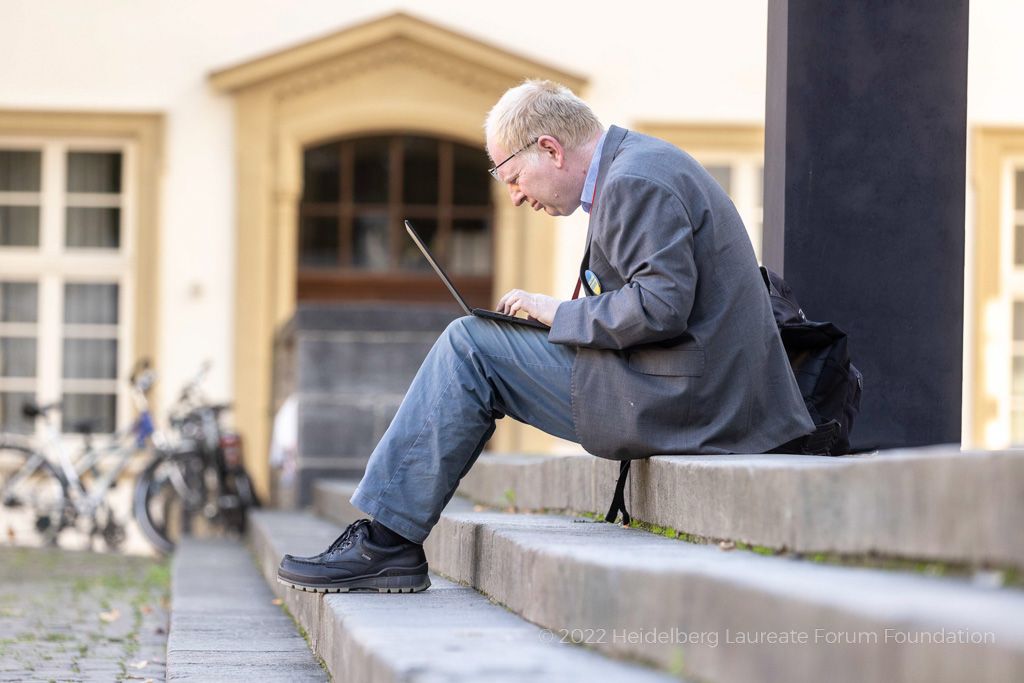Mathematics and Computer Science: The Challenges
BLOG: Heidelberg Laureate Forum

The first panel of #HLF22 was titled “Future Challenges in Mathematics and Computer Science”. The panel was moderated by Ragni Piene (University of Oslo) and featured Eric A. Brewer (ACM Prize in Computing – 2009), Alexei Efros (ACM Prize in Computing – 2016), Carlos Kenig (President, International Mathematical Union), Shigefumi Mori (Fields Medal – 1990), and Cherri M. Pancake (Oregon State University). This is the second of two posts on the panel. The first post can be found here.

Alexei Efros. © Heidelberg Laureate Forum Foundation / Flemming
The Challenges
In recent years, the world has faced many difficulties. I hardly need mention these: I’m sure most people are acutely aware of the challenges we face as individuals and as a society. Climate change, the COVID-19 pandemic, wars and inequality. Mathematics and computer science aren’t immune to the impacts of these. Indeed, this year marked the return of an in-person Heidelberg Laureate Forum after two years of conducting it online.
Towards the end of the panel about the future challenges of mathematics and computer science, the mood turned sombre as the laureates and academics reflected on the difficulties faced by people around the world. In fact, all five panelists used their closing statements to make this same point.
Carlos Kenig began this discussion, and his words were so impactful that I’ll present them unedited: “I think one fundamental thing that we all need to develop, mathematics, computer science, and in general all human thought, is the possibility of expressing ourselves freely, having the opportunity to do our work without interference, and all things of that sort that are now very much in danger and we should work hard to maintain them.”
Next to make her closing statement was Cherri Pancake. She added to Kenig’s sentiment, stating that “underlying our assumption that we will be able to address these future challenges is the assumption that we will be able to do our work, speak out, share our information, and interact across disciplines, and that is in some doubt today. Maybe that’s our biggest challenge. Our most immediate one.”
Shigefumi Mori agreed with his colleagues, impressing the importance of collaboration in combating the issues: “For me, exchange of ideas like this is really the best way to fight against these challenges.”
Eric Brewer was the last to give his closing statement. He took a more optimistic approach than his colleagues, and focussed on the power mathematics and computer science has in tackling these issues. He described some of his work in poor communities and observed that the projects “went well because they came with a certain optimism and hope.” This led him to reflect that “Math and computer science has one great thing to offer for sure and that is hope for a better future, and I do believe that’s really what’s going to help our liberal democracy.”
Before Brewer gave his statement, though, Alexei Efros spoke. I’ve saved this until last as this was perhaps the most poignant moment of the entire forum. Efros was born in the Soviet Union. Today, he sat wearing a blue and yellow badge, with the words “I stand with Ukraine”. Efros began his closing statement saying “I want to echo the same point. That for science to progress, one has to have a liberal society. Because you need to have freedom of speech, you need to have freedom of thought, you need to have freedom of expression, freedom of travel, and this is so normal to a lot of people in Europe that they don’t give a second thought to it.” He went on to compare this to his experiences growing up, and urged attendees to fight for the freedoms they’ve taken for granted: “We are observing a war between dictatorships and liberal democracy. And I feel that everybody should go out of their way to define liberalism, to defend freedoms from what is attacking them right now”.
Alexei Efros finished with this statement: “This is something that we all have to be very very conscious of and understand. Because this is a threat to all of us, scientists and human beings.”
The full video of the panel can be found on the HLF YouTube channel.


Andere Einschätzung hierzu :
+
Dr. Webbaer sieht hier anders.
Die Ukraine, die er bereist hat, wie Russland, das er nicht bereist hat, aber schon irgendwie kennt, zu kennen glaubt, qua Russen, die er dann doch wiederum kennt, ist sozusagen eine Oligarchie, eine Scheindemokratie, bei extrem hoher Korruptionsrate, und Russland eine sozusagen Meritokratie, FSB und so.
Dr. W kennt auch Leute aus der Ukraine,
Hat sich so beiderseitig auseinander gesetzt, vor vielleicht 20 Jahren.
Auch den Nationalismus (Bandera und so) meinend, der in der Ukraine vor nicht so-o langer Zeit aufkam, ganz unter unter uns verraten lagen aus seiner Sicht jeweils Russen vor.
Eine Sprachverschiebung gab es, dies anderer Herrschaft geschuldet,
‘A war between dictatorships and liberal democracy’ liegt nicht vor und ansonsten rät Dr. Webaber an abzusteifen.
Unsere US-amerikanischen Freunde kennen den vor Ort vorliegenden Sachverhalt möglicherweise nur unzureichend.
Russland soll nicht besonders aggraviert werden, oder?
Kenne Russen, ihr Humor-Bedarf ist begrenzt.
Mit freunchlichen Grüßen
Dr. Webbaer (der also streng zu Verhandlungen rät und nicht den Sieg der Ukraine zu suchen)
Hello,
Thank you for commenting. I just wanted to make sure you were aware that Russia is not mentioned at all in the article. I also wanted to be clear that the only reference to Ukraine is the badge that was worn, not the words that were said.
There are many challenges being referred to here, and freedom of expression is undeniably important for everyone.